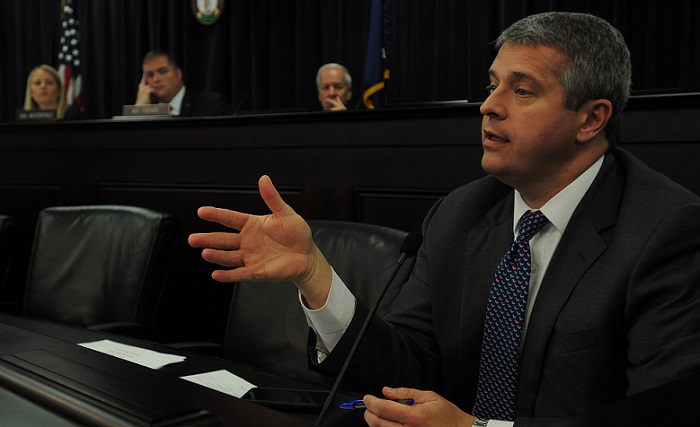FRANKFORT—Committee testimony on a 2018 bill that proposed adding to the list of low-level felonies that could be expunged in Kentucky led to comments Friday about the cost of felony expungement in the state.

Senate Minority Floor Leader Ray Jones, D-Pikeville, asking a question about felony expungement as it relates to 2018 SB 171.
Individuals who are certified to have their non-violent felony record expunged—or deleted from court records—in Kentucky must pay a $500 filing fee to apply to have the record deleted. The same $500 fee was proposed in 2018 Senate Bill 171, sponsored by Senate President Pro Tem Jimmy Higdon, R-Lebanon. That legislation, which did not become law this year but may be proposed again, would make additional low-level felonies eligible for expungement.
It is the felony expungement cost, however, that some members of the Interim Joint Committee on Judiciary expressed concern with during testimony today on both SB 171 and its predecessor 2016 House Bill 40, which was passed into law two years ago.
Rep. McKenzie Cantrell, D-Louisville, said a Louisville-area program called the Reily Reentry Project is paying expungement costs for those wanting to clear their criminal record and improve their quality of life. She said the $500 fee is “a real barrier” for many folks.
“I really would like for you to reconsider the amount of the filing fee that we’re charging because I think it is holding people back,” she told Higdon as he presented SB 171 before the committee for discussion.
In response, Higdon said there was some discussion during debate on HB 40 in the 2016 Regular Session about making it easier to pay the filing fee.
“I’m sure that would be something that we could do because it’s probably a good idea, if you owe the court, to pay them,” said Higdon. “They have ways to collect.”
Rep. Jason Nemes, R-Louisville, said those who have charges dismissed should not have to ask or pay to have their record cleared.
“If the (charge) is dismissed, that should be off my record immediately. I shouldn’t have to pay a dollar for that and I shouldn’t have to ask for it to be done,” said Nemes. He spoke specifically of misdemeanors, but said felonies may deserve some leeway as well.
“We need to start from the proposition that some of these Class Ds (low-level felonies) shouldn’t be felonies in the first place,” he said, adding that SB 171 “doesn’t go far enough.”
Higdon told Nemes that one solution could be to give more discretion to the judges and prosecutors and “let them decide.”
Current law requires that $50 of every $500 filing fee collected be put into a trust for deputy court clerks. Under SB 171, $50 of that $500 would also go to the Kentucky State Police for processing of expungements, and $100 would go to the Commonwealth’s Attorney’s office that prosecuted the case to help process expungements.
Felony expungements in Kentucky have increased exponentially since the passage of 2016 HB 40, according to officials from the Administrative Office of the Courts (AOC.) Kelly Stephens who manages the AOC’s Information and Technology Services (ITS) Court Services Division told the committee that there were 83 felony expungements granted in Kentucky in 2016. That number grew to 912 in 2017, followed by 330 felony expungements to date in 2018, she said.
“In 2016 – (HB 40) was passed and effective July 15 – the process itself can take up to six months, so we didn’t see as many in 2016,” she said. “In 2017, I think we saw the numbers kind of shake out how we expected.”
Expungements for acquittals, dismissed charges and misdemeanor convictions have also been numerous since 2016, said Stephens, with more than 15,000 of those expungements granted since 2016.









